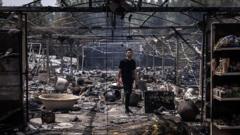As Israel grapples with aftermath of wildfires that scorched central regions, the government reports of injuries with hundreds evacuated, while conflicting statements regarding the fires' causes reveal deeper environmental concerns.
Wildfires Subside in Israel Following Extensive Evacuations

Wildfires Subside in Israel Following Extensive Evacuations
After significant evacuations, Israel's wildfires have largely been controlled, with no reported fatalities.
Fires that have caused extensive damage across central Israel since Wednesday appear to be under control, according to the country's Fire and Rescue Authority. The blazes, which have consumed approximately 20 square kilometers (7.7 square miles) in the Latrun area, situated between Jerusalem and Tel Aviv, prompted a robust response with over 150 firefighting teams on the ground. While at least 12 individuals were treated for smoke inhalation, authorities confirm that there were no fatalities. Reports highlight that 17 firefighters sustained injuries during the operations.
"Having served for 24 years, I can assert that this is among the most challenging fires I have encountered," stated Shlomi Harush, a deputy commander at the Ayalon fire station. The fires, intensified by hot, dry weather and strong winds, initially posed significant challenges to emergency services, with concerns that they may reignite under similar conditions.
In response to the escalating situation, Israeli Prime Minister Benjamin Netanyahu declared a national emergency, leading to widespread evacuations. However, the evacuation orders for 12 towns near Jerusalem have since been lifted as the situation stabilizes. International support has come from countries such as France, Italy, and Spain, which dispatched aircraft to assist with firefighting efforts.
The wildfires interrupted Israel's Independence Day celebrations, leading to the cancellation of most official events and implementing a nationwide ban on lighting fires for traditional barbecues. Major highway routes, including the vital connection between Jerusalem and Tel Aviv, have reopened, though chaos ensued earlier in the week as drivers abandoned their cars due to rapidly approaching flames.
Reports on the cause of the fires have differed. Israeli President Isaac Herzog attributed the situation to the ongoing climate crisis, indicating a need for serious consideration of environmental issues. In contrast, Prime Minister Netanyahu suggested arson was a key factor, mentioning the arrest of 18 suspects. However, Israeli police later clarified that only three individuals were detained, with no evidence linking them directly to the wildfires.























